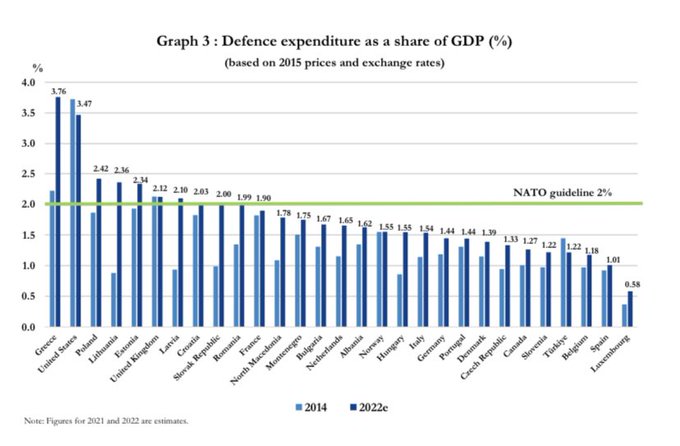The North Atlantic Treaty Organization’s secretary general confirmed NATO is boosting its forces in Europe to “well over 300,000” from the current 40,000, a 650 percent increase. NATO Secretary General Jens Stoltenberg claims it’s to respond to the Russian invasion of Ukraine.
Setting aside the obvious ridiculousness of NATO boosting a deterrence force, however, at the very same time Russia is failing to conquer even Ukraine and is increasingly bogged down, such euphemisms from NATO are jarring. Everyone understands this means U.S. taxpayers will carry an additional burden for European security.
Consider the details: President Biden will deploy additional troops to Romania and the Baltic states, establish and maintain the permanent Fifth Army Corps in Poland, send two F-35 squadrons to the United Kingdom and air defenses to Germany and Italy, and increase the number of destroyers stationed in Spain from four to six.
The new additions are so bizarrely out of proportion to the threat that it provoked one of the most hawkish Republicans, Florida Sen. Marco Rubio, to question why Biden is reinforcing Europe at the cost of the Pacific: “Russia’s military is in no condition to invade anyone else right now and its China & North Korea who are threatening military aggression,” Rubio tweeted.
In a time of inflation and with a rapid Chinese military build-up in the Indo-Pacific, Biden is doubling down on providing security for Europe when the United States should be “burden-shifting,” especially with relatively finite naval assets and as rich European economic powerhouses like Germany already free-ride on American taxpayers.
The question of Germany is crucial in this regard. As former Deputy Assistant Secretary of Defense Elbridge Colby recently tweeted, “It’s a commonplace in American discussion that German foreign policy has been ‘naive.’ Well, Germany spends almost nothing on defense and has peacefully become the economic hegemon of Europe. Meantime we’ve had failed Middle East wars and enabled China’s rise. Who’s naive?”
Colby is, of course, correct. The idea that German foreign policy is derived from pacifism and war guilt, not one of the cleverest instances of strategic “buck passing,” is perhaps the most debilitating assumption of Anglo-American grand strategies. It’s a misjudgment that German strategists are more than happy to see continue, because they are smart.
Only nine countries reach the required defense spending within NATO, even after four years of President Trump pushing and an invasion of Ukraine.

When the richest countries in the richest continent can make two other external maritime great powers such as the United Kingdom and the United States, neither part of the mainland, pay for their security, it can be considered a major win—for the continent.
A recent paper titled “Woke Imperium” helps explain this development. In a normal world, a decimated Russian invasion force bogged down in Ukraine would be an opportunity for further retrenchment from Europe, letting the rich Europeans share their own security burden, it observes. Instead, we see a doubling down on rhetoric about the “liberal international order,” promoted by the same NGOcracy that led to wasting trillions in Afghanistan to allegedly ensure girl’s schools and democratic institutions, as the paper notes:
“The rise of a ‘woke’ activist-driven, social justice-oriented politics—particularly among the members of academia, media, and the professional managerial class—has provided the latest ideological justification for interventionism, and it has become readily adopted by the U.S. foreign policy establishment. These groups now have an even greater level of symbiotic relationship with state actors,” the paper states, adding, “the emerging hegemonic posture and its moral imperialism are at odds with a sober and realistic appraisal of U.S. interests on the world stage, as they create untenable, maximalist, and utopian goals that clash with the concrete realities on which U.S. grand strategy must be based.”
The paper goes on to argue that the “liberal Atlanticist tendency” to drive “moralism and social engineering” may well create a backlash around the world, creating “new forms of anti-Westernism.” Put simply, U.S. foreign policy is now completely utopian, disregarding geography and interests and betting trillions on amorphous aims such as ensuring rights in Ukraine and further subsidizing Europe, all to maintain some mythical liberal international order that was never very orderly nor international to begin with.
Whether and how long Americans are willing to accept this bipartisan internationalist edifice, at the cost of declining living standards and rising crime at home, remains to be seen.

